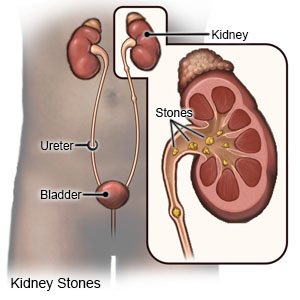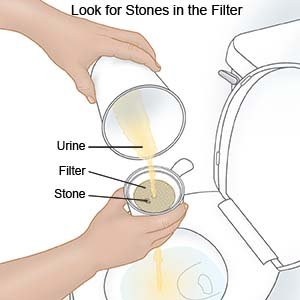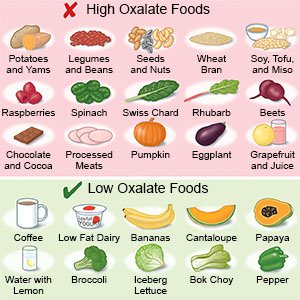Kidney Stones
Medically reviewed by Drugs.com. Last updated on Aug 4, 2025.
Kidney stones form in the urinary system when the water and waste in your urine are out of balance. When this happens, certain types of waste crystals separate from the urine. The crystals build up and form kidney stones. You may have more than one kidney stone.
 |
DISCHARGE INSTRUCTIONS:
Return to the emergency department if:
- You are vomiting and it is not relieved with medicine.
Call your doctor or kidney specialist if:
- You have a fever.
- You have trouble urinating.
- You see blood in your urine.
- You have severe pain.
- You have any questions or concerns about your condition or care.
Related medications
Treatment options
The following list of medications are related to or used in the treatment of this condition.
Medicines:
You may need any of the following:
- NSAIDs , such as ibuprofen, help decrease swelling, pain, and fever. This medicine is available with or without a doctor's order. NSAIDs can cause stomach bleeding or kidney problems in certain people. If you take blood thinner medicine, always ask your healthcare provider if NSAIDs are safe for you. Always read the medicine label and follow directions.
- Acetaminophen decreases pain and fever. It is available without a doctor's order. Ask how much to take and how often to take it. Follow directions. Read the labels of all other medicines you are using to see if they also contain acetaminophen, or ask your doctor or pharmacist. Acetaminophen can cause liver damage if not taken correctly.
- Prescription pain medicine may be given. Ask your healthcare provider how to take this medicine safely. Some prescription pain medicines contain acetaminophen. Do not take other medicines that contain acetaminophen without talking to your healthcare provider. Too much acetaminophen may cause liver damage. Prescription pain medicine may cause constipation. Ask your healthcare provider how to prevent or treat constipation.
- Medicines to balance your electrolytes may be needed.
- Take your medicine as directed. Contact your healthcare provider if you think your medicine is not helping or if you have side effects. Tell your provider if you are allergic to any medicine. Keep a list of the medicines, vitamins, and herbs you take. Include the amounts, and when and why you take them. Bring the list or the pill bottles to follow-up visits. Carry your medicine list with you in case of an emergency.
What you can do to manage kidney stones:
- Drink more liquids. Your healthcare provider may tell you to drink at least 8 to 12 (eight-ounce) cups of liquids each day. This helps flush out the kidney stones when you urinate. Water is the best liquid to drink.
- Strain your urine every time you go to the bathroom. Urinate through a strainer or a piece of thin cloth to catch the stones. Take the stones to your healthcare provider so they can be sent to the lab for tests. This will help your healthcare providers plan the best treatment for you.

- Ask if you should avoid any foods. You may need to limit oxalate. Oxalate is a chemical found in some plant foods. The most common type of kidney stone is made up of crystals that contain calcium and oxalate. Your healthcare provider or dietitian may recommend that you limit oxalate if you get this type of kidney stone often. You may need to limit how much sodium (salt) or protein you eat. Ask for information about the best foods for you.

- Be physically active as directed. Your stones may pass more easily if you stay active. Physical activity can also help you manage your weight. Ask about the best activities for you.

After you pass the kidney stones:
Your healthcare provider may order a 24-hour urine test. Results from a 24-hour urine test will help your healthcare provider plan ways to prevent more stones from forming. Your healthcare provider will give you more instructions.
Follow up with your doctor or kidney specialist as directed:
Write down your questions so you remember to ask them during your visits.
© Copyright Merative 2025 Information is for End User's use only and may not be sold, redistributed or otherwise used for commercial purposes.
The above information is an educational aid only. It is not intended as medical advice for individual conditions or treatments. Talk to your doctor, nurse or pharmacist before following any medical regimen to see if it is safe and effective for you.
Learn more about Kidney Stones
Treatment options
Care guides
Symptoms and treatments
Medicine.com guides (external)
Further information
Always consult your healthcare provider to ensure the information displayed on this page applies to your personal circumstances.
